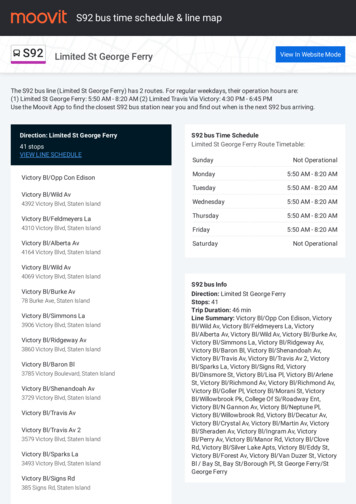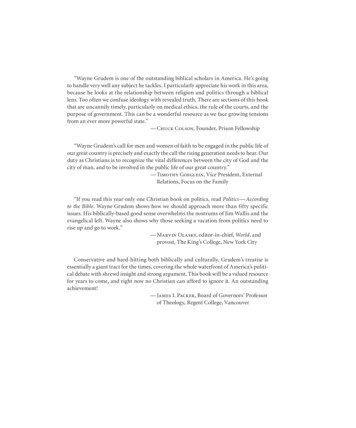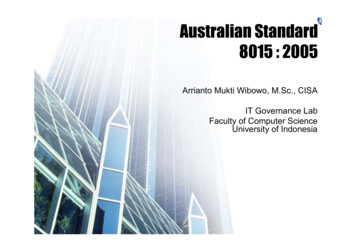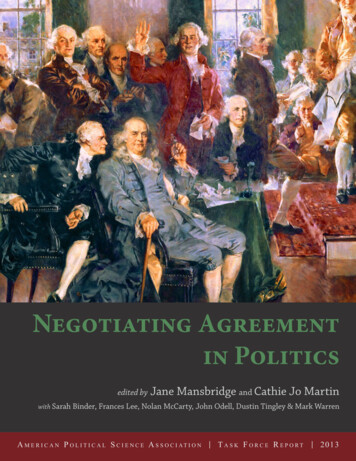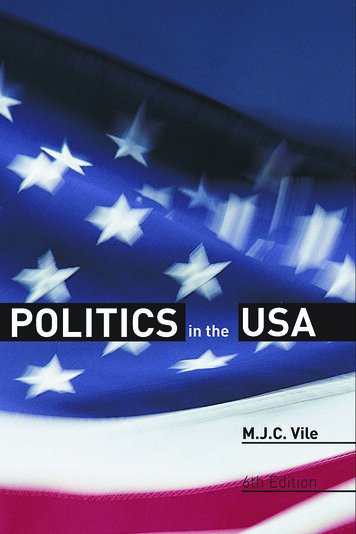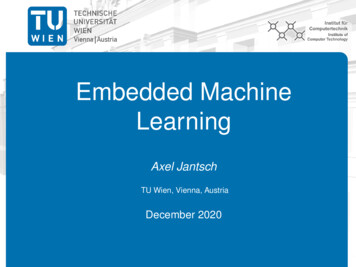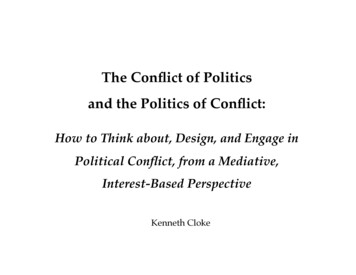
Transcription
The Conflict of Politics!and the Politics of Conflict:!How to Think about, Design, and Engage inPolitical Conflict, from a Mediative, !Interest-Based PerspectiveKenneth Cloke
How to Think about Politics andPolitical Conflicts2
“Genuine politics – politics worthy of the name, and the only politics I amwilling to devote myself to – is simply a matter of serving those around us:serving the community, and serving those who will come after us. It'sdeepest roots are moral because it is a responsibility [T]here is only oneway to strive for decency, reason, responsibility, sincerity, civility, andtolerance, and that is decently, reasonably, responsibly, sincerely, civilly, andtolerantly. I’m aware that, in everyday politics, this is not seen as the mostpractical way of going about it.”Vaclav Havel3
Some Classical Purposes of Politics Search for the highest common good (Aristotle) Provide for the general welfare (Aristotle) Make sure that laws are fairly conceived, wiselyinterpreted and justly enforced (Aristotle) Make the citizen “as good as possible.” (Socrates) Search for justice (Plato) Support “ not the disproportionate happiness ofany one class, but the greatest happiness of thewhole.” (Plato) Promote democracy (Democritus) Kenneth Cloke4
“Every state is a community of some kind, and every community isestablished with a view to some good, for mankind always act in order toobtain that which they think good. But, if all communities aim at somegood, the state or political community, which is the highest of all, andwhich embraces all the rest, aims, and in a greater degree than any other,at the highest good.”Aristotle5
Aristotelian Logic and Politics1.2.3.The Law of Identity: A statement is what it is. A is identical to A. Yetwe know there are times when A is not entirely A. For example,political calls to “support our soldiers” or “be tough on criminals”may mask calls to war or discriminatory social policies.The Law of Non-contradiction: A statement and its contradictioncannot both be true. If A is true and B is the opposite of A, both Aand B cannot be true. Yet we know there are times in politics whenA and B are both true and opposites. For example, political partiesfrequently assert opposing claims and principles about complexissues that cannot be reduced to single truths. Physicist Neils Bohrcalled these “complementarities,” which are “great truths whoseopposites are also great truths.”The Law of the Excluded Middle: A statement is either true or false, andcannot be both true and false at the same time. Yet we know thereare times when political statements are both true and false at thesame time. For example, the stories political opponents tell aboutthemselves and each other may be true and false at the same time. Kenneth Cloke6
Aristotle’s Forms of Political Persuasion,Advocacy, or Rhetoric1.Logos: Arguments based on logic or reason, or on evidence such asfacts or figures. Yet is it common for political candidates to playfast-and-loose with facts and figures, and for fact checking andcorrections to go unnoticed.2.Ethos: Arguments based on character or ethics, or on credibility orexpertise. Yet political debates often place a premium on characterassassination, ignore ethical violations, and discount bothcredibility and expertise.3.Pathos: Arguments based on emotion or feelings. Yet powerfulnegative feelings like fear and anger can be stirred up by politicaldebates, and easily overwhelm rationality. Kenneth Cloke7
Five Other Forms of Political Persuasion1. Personal Experience and Empathy, chiefly throughstorytelling, dialogue and empathetic listening2. Vision and Values, chiefly through leadership,commitment and modeling3. Synergy and Syntheses, chiefly through conflictresolution and the integration of competing ideas4. Beauty and Symmetry, chiefly through the arts,sciences and mathematical equations5. Love and Caring, chiefly through kindness, heartfeltinteractions, shared intimacy and relationships Kenneth Cloke8
Adversarial Ways of Defining Politics Ways of organizing and exercising power over and against others,especially using war, violence, intimidation and coercionA top-down method of problem solving and conflict resolution thatfavors one group of people over anotherA way of unifying in-groups by pitting them against out-groupsThe gradual narrowing of options through hostility and criticismRules designed by a minority of the propertied to exercise controlover a majority of the propertylessRules against cheating and private violence, and a process forresolving disputes through adjudicationWays of collecting taxes, protecting private property anddistributing power, wealth and resources among groups of peopleAlternative visions of a desirable or undesirable futureThe exercise of control over people within a set geographical areaA concentration of coercion and a monopoly over the “legitimate”use of force and violence, A hierarchy in social decision making,status and privilege9 Kenneth Cloke
Other Ways of Defining Politics (1) A process of social problem solving that can be adversarial orcollaborative A collection of ideas, beliefs, interests and desires for the future A group of conversations about what should be done and why A set of stories and beliefs about the past that shape the future A set of relationships and processes organized around power A diverse group of people trying to agree on a common goal A system for making decisions that bind everyone A living, evolving, adapting expression of national identity A variety of interlocking activities and processes A culture or mind-set about people, power and privilege A way of fixing and diffusing responsibility A compact, agreement, or contract reconciling competing interests A mix of unspoken expectations and desires A continually evolving set of values and purposes A way of resolving conflicts, a mediation between diverse interests Kenneth Cloke10
Other Ways of Defining Politics (2) Ways of organizing and exercising power, especially through war A top-down method of problem solving and conflict resolution A way of uniting some people by dividing them against others The narrowing of options through choice and implementation Activities associated with governance of groups of people,including coinage, weights and measures and adjudication Alternative visions of a desirable or undesirable future The exercise of control over people within a set geographical area Ways of collecting taxes, protecting private property anddistributing power, wealth and resources among groups of people A concentration of coercion and a monopoly over the “legitimate”use of force and violence, A hierarchy in social decision making,status and privilege A set of adversarially negotiated social outcomes Legally sanctioned, legitimate forms of domination by the State Kenneth Cloke11
Some Quotes on Politics (1) “A strife of interests masquerading as a contest of principles. Theconduct of public affairs for private advantage.” Ambrose Bierce “Politics is the art of compromise and decision making based onsocial benefits weighed against costs.” Max Weber “Politics is the art of looking for trouble, finding it everywhere,diagnosing it incorrectly and applying the wrong remedies.”Groucho Marx “Political language is designed to make lies sound truthful andmurder respectable.” George Orwell “Politics is almost as exciting as war, and quite as dangerous. Inwar, you can only be killed once, but in politics many times.”Winston Churchill “Politics is the art of preventing people from sticking their nosesin things that are properly their business.” Paul Valery “Politics is the entertainment division of the military industrialcomplex.” Frank Zappa Kenneth Cloke12
Some Quotes on Politics (2) “Politics is war without bloodshed, while war is politics withbloodshed.” Mao Tse Tung“Just because you do not take an interest in politics does not meanpolitics won’t take an interest in you.” Pericles“Politicians are the same the world over, they promise to build abridge even when there is no river.” Nikita Khrushchev“Finance is a gun. Politics is knowing when to pull the trigger.”Mario Puzo“In politics, stupidity is not a handicap.” Napoleon Bonaparte“Government is the great fiction through which everyoneendeavors to live at the expense of everyone else.” Frederic Bastiat“Practical politics consists in ignoring facts.” Henry Adams“Without alienation, there can be no politics.” Arthur Miller“War is the continuation of politics by other means.” Karl vonClausewitz“Finality is not the language of politics.” Benjamin Disraeli Kenneth Cloke13
What’s Wrong with Politics as Usual It is unnecessarily divisive and adversarial It is nearly always win/lose and winner take all It is power-based, yet “all power corrupts and absolute powercorrupts absolutely;” or rights-based, yet controlled by power It takes too long, costs too much, and is exercised too personally It is increasingly ineffective in solving global problems It is controlled by wealthy individuals, military and industrialelites, corporations and special interests Global political collaborations, as in the United Nations, areperceived as reducing sovereignty and imposing alien ideas There is little interest among elites in openness or directdemocracy, and great interest in secrecy and amassing power It easily slips into autocracy and boosts social inequality It generates bureaucracy and corruption, stifles change andincreases chronic conflict Kenneth Cloke14
“So long as only one ideal is the true goal, it will always seem to men thatno means can be too difficult, no price too high, to do whatever is required torealize the ultimate goal. Such certainty is one of the great justifications offanaticism, compulsion, persecution . If there is only one solution to thepuzzle, then the only problems are first how to find it, then how to realize it,and finally how to convert others to the solution by persuasion or by force.But if this is not so , then the path is open to empiricism, pluralism,tolerance, compromise. Tolerance is historically the product of therealization of the irreconcilability of equally dogmatic faiths, and thepractical improbability of complete victory of one over the other. Those whowished to survive realized that they had to tolerate error. They graduallycame to see the merits of diversity, and so became skeptical about definitivesolutions in human affairs.”Isaiah Berlin15
Three Simple Interest-Based !Ways of Defining Politics1.Politics is a social problem-solving process. As a result, a diversity ofviews about the nature of the problem and alternative ways ofsolving it will predictably result in better, more sustainablesolutions.2.Politics is a large group decision-making process. As a result, thegreater the consensus, the stronger the democracy, and the morepeople agree with a decision, the more likely it is to be effective.3.Politics is a conflict resolution process. As a result, the amount ofchronic, on-going, systemic conflict can be dramatically reducedby assuming there is more than one correct answer and a complex,egalitarian, interest-based approach can result in no one having tolose so that that others are able to win. Kenneth Cloke16
Three Elements of Political Conflict (1)1. Diversity: In the first place, there must be two or more distinctindividuals or groups of people, each with diverse beliefs, ideas,opinions, needs, and interests. Without this, there cannot beconflict.2. Inequality: In the second place, there must be an inequality inpower between these individuals or groups, reflecting their abilityto implement their diverse beliefs, ideas, opinions, etc. Withoutthis, the conflict will not take a political form.3. Adversarial, win/lose process: In the third place, there must be anadversarial, win/lose process for problem solving or decisionmaking that pits diverse groups against each other, allowing onlyone to win. Without this, the conflict will not become polarizing.17 Kenneth Cloke
Three Elements of Political Conflict (2)1. Conservatives and the right commonly seek to reduce the level ofpolitical conflict by decreasing diversity, boosting respect foraccepted, conventional ideas, and buttressing established authority.2. Liberals and the left seek to do so by increasing equality, drawingattention to new and diverse ideas, and championing the freedomto articulate, argue for and implement them.3. Neither, however, focuses much attention on the adversarial win/lose nature of the political process, without which diversity andinequality do not routinely result in political polarization. Kenneth Cloke18
The Neurophysiology of !Political Conflict19
“The whole aim of practical politics is to keep the populace in a continualstate of alarm (and hence clamorous to be led to safety) by menacing themwith an endless series of hobgoblins, all of them imaginary.” !H. L. Mencken20
Brain Hemispheres Kenneth Cloke21
Cancelation of Duality122
Context and Illusion123
Areas of the Brain Involved in Conflict Kenneth Cloke24
Antagonistic Systems of Social Emotions25Source: Olga M. Klimecki, The Plasticity of Social Emotions, SOCIAL NEUROSCIENCE, 2015]
Location and Plasticity of Social Emotions26Source: Olga M. Klimecki, The Plasticity of Social Emotions, SOCIAL NEUROSCIENCE, 2015]
Emotions, Bias, and Social StereotypingHigh Status Competitors[for example, corporate executives or rich people]Trigger feelings of envyResulting in mimicry and hostilityLow Status CompetitorsHigh Status Non-Competitors[for example, migrants or poor people][for example, family and allies]Trigger feelings of disgustTrigger feelings of prideResulting in punishmentResulting in favoritismLow Status Non-Competitors[for example, elderly or disabled]Trigger feelings of pityResulting in patronizing[Based on research by Susan Fiske and colleagues at Princeton.] Kenneth Cloke27
Red Brain / Blue Brain (1) Dr. Darren Schreiber at the University of Exeter, with colleagues at theUniversity of California, San Diego, measured brain activity as participantsplayed a simple gambling game. They found Republicans and Democratsdo not differ in the risks they take, but there were striking differences in theparticipants' brain activity during the risk-taking task. Democrats showed significantly greater activity in the left posterior insula,a region associated with social and self-awareness, while Republicansshowed significantly greater activity in the right amygdala, a regioninvolved in the body's fight-or-flight system. Brain activity in these two regions alone can be used to predict whether aperson is a Democrat or Republican with 82.9% accuracy. By comparison,the longstanding model in political science, which uses the party affiliationof a person's mother and father to predict the child's affiliation, is onlyaccurate about 69.5% of the time. Another model based on differences inbrain structure distinguishes liberals from conservatives with only 71.6%accuracy. These results suggest that liberals and conservatives engage differentcognitive processes when they think about risk.[Darren Schreiber, Greg Fonzo, Alan N. Simmons, Christopher T. Dawes, Taru Flagan, James H. Fowler, Martin P.Paulus. Red Brain, Blue Brain: Evaluative Processes Differ in Democrats and Republicans. PLoS ONE, 2013; 8 (2):e52970 DOI: 10.1371/journal.pone.0052970]28 Kenneth Cloke
Red Brain / Blue Brain (2) People who self-identify as conservative have larger and more active rightamygdalas, an area of the brain associated with the expression andprocessing of fear. A 2011 study looked at MRI scans of self-described conservative youngadults and found they had more grey matter volume in the right amygdalathan their liberal counterparts. In 2013, another team of scientists expandedthat research to show that conservatives generally have more activity intheir right amygdala when taking risks than liberals do. Recently, Yale professor John Bargh told a group of participants to imaginethey'd been granted a superpower by a magic genie and were as invincibleas Superman -- bullets bounced off them, fire couldn't scorch their skin, and"a fall from a cliff wouldn't hurt at all.” A control group was simply told toimagine they could fly. Researchers asked them political questions,including whether they "would be reluctant to make any large-scalechanges to the social order," and whether "it's okay if some groups havemore of a chance in life than others." Liberal participants' attitudes on social issues didn't shift at all.Conservative participants, on the other hand, began adopting more liberalviews on social issues (though not economic ones.) Those who imaginedthemselves with the ability to fly had no change in their political views. Kenneth Cloke29
Red Brain/Blue Brain30 Kenneth Cloke
Red Brain / Blue Brain (3) A study published in the journal Behavioural Brain Research in Januarysuggests that you can tell whether someone is liberal or conservative simplyby the way they react to pictures of things like blood, feces or vomit. Thestudy found that socially conservative students physically look away from"disgusting" images more quickly than their liberal peers (but the same didnot hold true for people with fiscally conservative beliefs). Self-reportedsocial conservatives also stared longer at images of faces reacting in disgustto the same images. This was not true for sad or scary images, however, andthere were no significant differences in how people reacted to these imagesbased on their political beliefs. Self-identified conservatives are more hostile to "outgroups” and to people(or animals) that don't come from the places they do, or think like them. In another study, conservatives tended to agree with statements like "I oftenhave tender, concerned feelings for my family members who are lessfortunate than me.” Liberals more frequently reported feeling tendernesstoward less fortunate people in general, beyond those in their own families. Conservatives were more likely to tell researchers that they had moreempathy for family members over friends, endorsed fellow countrymenover foreigners, and took the side of humans over non-human subjects. Kenneth Cloke31
Politics, Poverty, Disease and Disgust Jonas Olofsson and his team at Stockholm University in Sweden,have shown that disgust helps explain why people lean towardright wing thinking. “We thought body odor disgust might be related to authoritarianideological attitudes, because inter-group contact and social changeis minimized in authoritarian societies, which might make disgustsensitive individuals feel that those societies are more ‘safe’ fromcontamination Across three studies, we found that body-odordisgust was indeed associated with the degree to which personsreported authoritarian attitudes.” Body odor, Olofsson’s team believes, is a shorthand people rely onwhen gauging how riddled with germs someone might be. So it’smore a person’s fear of disease, rather a dislike of sweat, thatexplains why they might be authoritarian. This aversion applied toboth their own odor and that of others. Kenneth Cloke32
The Level of Political Discourse Researchers looked at 3.5 billion comments from 25.3 million peoplebetween 2007 and 2017 on Reddit, a social network built arounddiscussion groups used by more than 230 million people a month, andlooked at the frequency of offensive words and phrases in political andnon-political groups. They found that while non-political comments were fairly civil, peoplewere 35% more likely to use offensive language in political discourse, andthese comments were move offensive between May 2016 and May 2017than any other period in the last 10 years. Also, political commentsdropped on average from 7th grade (age 12) to 1st grade (age 6) since 2007. Alcohol use shifts political views to the right, researchers find, because itstrips away complex reasoning. People could be moved to the politicalright also by distracting them, or putting them under time pressure, ortelling them not to think too hard. Those asked to deliberate more deeplyshifted their political thinking to the left. Right-wing and fascist ideologies were associated with dislike ofambiguity and cognitive complexity, and the lowest 10% in intelligence.The highest 10% in intelligence were inclined either to the left or tolibertarian views. Kenneth Cloke33
Research on Priming (1) Priming is the unconscious activation or “priming” of attitudes,ideas and behaviors by association with words or objects that act asmetaphors. Integrating words such as “cooperation” and “fairness” intosentences can result in a higher occurrence of these behaviors. When subjects were asked to think about the lowest and highest fairprices for a car before negotiating, they made conciliatory movesmore quickly, were happier with the results, reached agreement inhalf the time, and were willing to negotiate again. Students primed with the word “rudeness” interrupted morequickly than others. People using a public bathroom were more willing to pay a fee onthe honor system if the word “honesty” was posted, or to pay forcoffee if a picture of a face or an eye was posted nearby. Seeing a briefcase or sitting in a hard chair caused negotiators tooffer less than if they saw a backpack or sat in a soft chair. Kenneth Cloke34
Research on Priming (2) Scores in Trivial Pursuit were increased by thinking of a professorand decreased by thinking of a soccer hooligan. People who were primed with the names of their friends were morewilling to help others, including strangers. Researchers in Israel conducted a study involving 76 Israel-bornJews, 59 Israeli Arabs and 53 Palestinians living in the occupiedPalestinian territories. Each individual was randomly assigned areading – one portraying groups as having a fixed nature and theother describing them as flexible and open to change. Those primedto believe their adversaries were changeable were significantly moreoptimistic about their ability to reach a negotiated peace, suggestingthey would be more willing to compromise to reach agreement. Group members primed with the words dependable, helpful, share andsupport were more cooperative within their group than others, evento their individual economic detriment. Chances that a player will cooperate in Prisoner’s Dilemma if it’scalled a “community game”: 7 in 10. If its called a “Wall Street35game”: 3 in 10. Kenneth Cloke
Politics and Priming (1) A study of voting patterns in Arizona in 2000 showedthat support for school funding propositions wasgreater if the polling station was in a school than in adifferent location. A different experiment showed that people exposed toimages of classrooms and school lockers also increasedtheir tendency to vote for school funding initiatives. This difference was greater than that between voterswho were parents and voters who were not. On the other hand, words and images of money causedpeople to become more selfish, sit farther apart, and beless willing to help someone who pretended to beconfused about a task, or to help pick up pencils aresearcher dropped on the floor.[Source: Daniel Kahneman, Thinking Fast and Slow (2011), p. 55] Kenneth Cloke36
Politics and Priming (2) Reminding people of their mortality increases theappeal of authoritarian ideas. Subjects asked to complete the word fragments W Hand S P were more likely to complete them as WASHand SOAP if they had been primed to think about anaction of which they were ashamed, and as WISH andSOUP if they were primed to think of food. Merely thinking about stabbing a coworker in the backleaves people more inclined to buy soap, disinfectantor detergent than batteries, juice or candy. This also connects to body parts. People asked to lie toan imaginary person over the phone preferredmouthwash over soap, while those who lied in emailpreferred soap.[Source: Daniel Kahneman, Thinking Fast and Slow (2011), pp. 55-56] Kenneth Cloke37
Research on Cognitive Ease (1) “A reliable way to make people believe in falsehoods is frequentrepetition, because familiarity is not easily distinguished fromtruth.” Daniel Kahneman The entire statement of a fact or idea does not need to be repeatedto make it appear true. People who were repeatedly exposed to the phrase “the bodytemperature of a chicken” were more likely to accept as true thestatement “the body temperature of a chicken is 144 degrees (orany other number).” Compare these statements:Adolf Hitler was born in 1892.Adolf Hitler was born in 1887.Both are false but the first is easier to read and more likely to bebelieved, especially if it is bright blue or red.[Source: Daniel Kahneman, Thinking Fast and Slow (2011), pp. 62-63] Kenneth Cloke38
Research on Cognitive Ease (2) Cognitive ease and believability also occur when simple language iscontrasted with complex language, especially in politics. Aphorisms were judged more insightful when their ideas arepresented as rhymed phrases, as in “Woes unite foes” as opposed to“Woes unite enemies.” Participants in a study were asked to evaluate the prospects offictitious Turkish companies based on reports. One was namedArtan and the other Taahut. More weight was given to the formerthan the latter. Mathematical puzzles that were presented in a small font in washedout gray print to induce cognitive strain or a large easy to read fontresulted in 90% of the participants making errors where the font waseasily readable, and only 35% making errors where it was harder toread. Recipes are rated harder to make if they are in a small, complex font.[Source: Daniel Kahneman, Thinking Fast and Slow (2011), pp. 64-65] Kenneth Cloke39
Sources and Outcomes of Cognitive EaseRepeated ExperienceFeels FamiliarClear DisplayFeels TrueEasePrimed IdeaFeels GoodGood MoodFeels Effortless[Source: Daniel Kahneman, Thinking Fast and Slow (2011), pp. 59-60] Kenneth Cloke40
Some Implications for Mediators (1) Create an environment with objects that “prime” or encouragecollaboration and dialogue. Use soft chairs, serve hot drinks orfood, and create a welcoming atmosphere. Slow, soften and relax your tone of voice, and create a context ofacknowledgement and appreciation. Thank them for coming. Listen closely to the words they use and search for ways ofreframing them from negative to positive. Ask them, for example,what words they would use to describe the kind of conversationthey want to have, or what they most want to say to each other, orhear the other person say in response. Use words repeatedly that emphasize the outcomes you want toachieve, like “fair” or “satisfying” or “creative.” Try to avoidwords like “tough” or “win” or “dissatisfied” or “hard.” Speak to both hemispheres of the brain, and help translatebetween them. When a “left brain” point is made, see if you cantranslate it into “right brain” language. Meditate regularly to build empathy and emotional balance. Kenneth Cloke41
Some Implications for Mediators (2) Avoid pictures or objects that denote fighting, imbalance,hardness, roughness, coldness. Favor items that connote balance,cooperation, unison of movement or rhythm, warmness, softness.Keep the temperature on the warm side. Bring emotional processing into the conversation by asking “Whyis that important to you?” or “What does that mean to you?” Make unilateral, unexpected concessions yourself, and ask theparties to do the same, for example by asking “What would yoube willing to offer, in a spirit of collaboration, without anyexpectation of return? Be “environmentally” generous, in attitude and demeanor. Seek ways of unifying both sides against the problem and itscauses. Remind them of what they have in common. Find ways ofencouraging them to act jointly, as in solving a common problem.Help them to act in synchrony. If you shake hands at the end, consider whether it would beappropriate to shake both parties hands at the same time. Kenneth Cloke42
The Language of Politics43
“When a society decays, it is language that is first to become gangrenous.Although moralists are scandalized by the fortunes amassed by therevolutionaries [in Mexico under the ruling party], they have failed toobserve that this material flowering has a verbal parallel; oratory has becomethe favorite literary genre of the prosperous. and alongside oratory, with itsplastic flowers, there is the barbarous syntax in many of our newspapers, thefoolishness of language on loudspeakers and the radio, the loathsomevulgarities of advertising -- all that asphyxiating rhetoric."Octavio Paz44
Power, Rights and InterestsPowerMilitary, Hierarchy, AutocracyOrders, Adversarial Negotiation, Chain of CommandRightsBureaucracy, Law, Formal Rules, Policies and ProceduresAdjudication, Arbitration, Decision, Positional NegotiationInterestsDemocracy, Civil Society, Values, Needs and DesiresInformal Problem Solving, Mediation, Dialogue, Collaborative Negotiation45 Kenneth Cloke
The Language of PowerThe language favored by power-based organizationssuch as the military, police, and monarchical statesrequires clarity, simplicity, and uniform interpretationin order to encourage unthinking obedience.The communications that emanate from theseinstitutions therefore take the form of declarations,propaganda, pronouncements, and orders, whichreinforce hierarchy and command, and implypunishment and contempt for those who disobey. Kenneth Cloke46
The Language of RightsThe language favored by rights-based organizations such aslegal institutions, bureaucracies, and formally democraticstates, requires narrow distinctions, exceptions, andadjudicated interpretations in order to maintain control bypermitting some behaviors and forbidding others.The communic
endeavors to live at the expense of everyone else." Frederic Bastiat "Practical politics consists in ignoring facts." Henry Adams "Without alienation, there can be no politics." Arthur Miller "War is the continuation of politics by other means." Karl von Clausewitz "Finality is not the language of politics."

